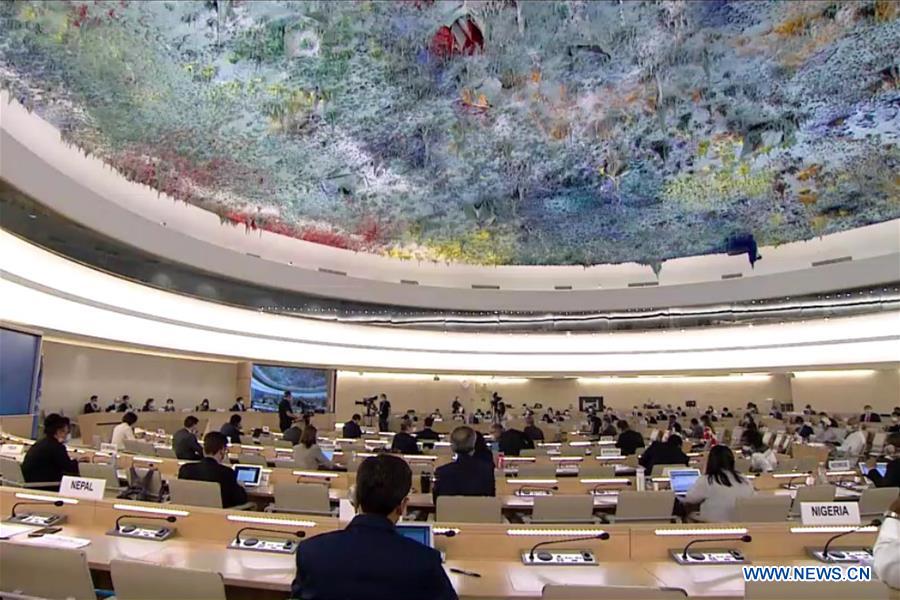UN Human Rights Council slams racism in wake of George Floyd's death
 0 Comment(s)
0 Comment(s) Print
Print E-mail Xinhua, June 20, 2020
E-mail Xinhua, June 20, 2020

The United Nations Human Rights Council (HRC) on Friday adopted a resolution strongly condemning the continuing racially discriminatory and violent practices perpetrated by law enforcement agencies against Africans and people of African descent.
The resolution, in particular, condemned police brutality that led to the deaths of U.S. citizen George Floyd in Minneapolis and other people of African descent.
The resolution, adopted by consensus without a vote in the 47-member UN body, also deplored the recent incidents of excessive use of force and other human rights violations by law enforcement officers against peaceful demonstrators defending the rights of Africans and people of African descent.
The resolution asked the UN High Commissioner for Human Rights to prepare a report on systemic racism, violations of international human rights law, and abuses against Africans and people of African descent by law enforcement agencies.
The report will contribute to accountability and redress for victims, said the resolution, calling on all states and relevant stakeholders to cooperate in the preparation of the report.
The resolution also requested the High Commissioner to examine government responses to anti-racism peaceful protests, including the alleged use of excessive force against protesters, bystanders and journalists.
Many journalists have reported attacks while doing their job in the U.S., with some estimates going as high as "148 arrests or attacks" in the U.S. between May 26 and June 2.
The resolution came in the wake of George Floyd's death in Minneapolis, Minnesota, on May 25. The 46-year-old African American died during an arrest after a white police officer kneeled on his neck for nearly nine minutes.
Videos from security cameras and made by witnesses later became public. Since then, protests in response to Floyd's death, and more broadly to police brutality, spread across the United States and took place in some other countries.
URGENT DEBATE
The resolution was adopted after an urgent debate on current racially inspired human rights violations, systemic racism, police brutality and violence against peaceful protests starting Wednesday, which was held at the request of Burkina Faso on behalf of the African Group.
Elisabeth Tichy-Fisslberger, president of the UN Human Rights Council for the duration of year 2020, opened the debate by bowing to all the victims and requesting those present to observe a moment of silence.
Amina Mohammed, deputy secretary-general of the UN, via video teleconference, said that the debate is a "historic debate," given that Afro-descendants still face poverty and structural racism. "I too, like Martin Luther King Jr, have a dream that my granddaughter Maya will grow up in a world where she will not be judged by the color of her skin but by the strength of her character," she said.
Michelle Bachelet, UN High Commissioner for Human Rights, said the wave of protests since the killing of George Floyd had been truly global, and encouraged the Council to heighten its focus on racism and racial discrimination.
E. Tendayi Achiume, UN Special Rapporteur on contemporary forms of racism, told the debate via video message that the world is witnessing the largest transnational mobilization against systemic racism in law enforcement sparked by the chilling images of the police killing of George Floyd.
Speakers expressed solidarity with and deepest condolences to the family of George Floyd, noting that systemic and institutionalized racism was a pervasive concern across the globe and the tragic killing of George Floyd brought this pervasiveness sharply into focus, as reflected in demonstrations worldwide. Colonial institutions, as historically employed by Europe in Africa to perpetuate marginalization, social exclusion and economic inequalities, were cited by speakers as root causes.
U.S. RACISM IN SPOTLIGHT
U.S. President Donald Trump pulled his country out of the 47-member body two years ago, but that didn't stop the Council from agreeing unanimously in holding the urgent debate, or from putting racism in the U.S. in the spotlight.
Roaring rage against racism in the U.S. was overwhelming, perhaps most personally and visibly from Philonise Floyd, brother of George Floyd, who sent a video message to the UN body's urgent debate.
"My brother, George Floyd, is one of many Black men and women that have been murdered by police in recent years. The sad truth is that his case is not unique. The way you saw my brother tortured and murdered on camera is the way Black people are treated by police in America," Philonise Floyd said.
"I hope that you will consider establishing an independent commission of inquiry to investigate police killings of Black people in America, and the violence used against peaceful protesters who are reminding the world that Black Lives Matter," he added.
Indeed, African countries had prepared a draft resolution that singled out the United States and attempted to launch intense international scrutiny. The initial draft called for a Commission of Inquiry -- the UN body's most powerful tool to inspect human rights violations -- to look into "systemic racism" and alleged violations of international human rights law and abuses against "Africans and of people of African descent in the United States of America and other parts of the world recently affected by law enforcement agencies."
U.S. Ambassador to the United Nations in Geneva Andrew Bremberg resorted to whataboutism in a Thursday statement, saying that "We are not above scrutiny" but "any HRC resolution on this topic that calls out countries by name should be inclusive."
In the end, after pushbacks from the U.S. and its allies, the resolution was heavily watered down.






Go to Forum >>0 Comment(s)